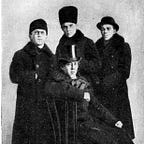Heraclitus’s River
I did not at first suppose that it was, as I gradually came to find it, the master-Key of philosophy.
- CS Peirce, on infinity
One of the views my grandma holds that seems like a hard divide with the latest generations is that she believes cultures should remain separate. She’s a peaceful person and doesn’t have a malicious heart. She respectfully prefers for people to be with their own in a habitual sense. Like you should be locked in with your culture and what’s happening. It’s cool to travel, visit, and make friends with other cultures. But there’s a special bond with your own that supersedes others.
The younger generation seem to be more interested in avoiding the politics of “other people” and rather see humans as a universal concept beyond individual cultures.
Avoiding politics, the younger generation finds itself at odds with older generations. Older generations that were shaped by a different world and whose politics are based and well-versed on the laws the younger generations were raised in. With the added wisdom of the elders and the aversion of politics in the young, the scene is set for a battle.
The elders have coercion, the same kind of coercion that shaped them. The young have a more abstract response.
The continuing complexity of understanding allows for those that don’t depend on dogma to explore contingency in an informed way.
An example is being gay. Without complex understanding, some less educated cultures blame bad weather and diseases on homosexual acts. With a more complex understanding of weather patterns and epidemiology, these beliefs wouldn’t be possible. What is possible is left in the abstract. Homosexuality doesn’t need to be completely understood to be cool with homosexual identities.
This openness in newer cultures is seen as suspect by the dogmatists.
The dogmatists isn’t a slur. It’s a tough, complex hierarchy made up of infinite phenomenological instances of realpolitik. The dogmatists aren’t dogmatists because they like it or want to believe what they believe. They believe what they believe because they’ve found it to be the wisest response to the real world.
They don’t need to see homosexuality causing bad weather to blame it. They believe homosexuality causes bad things because bad things happen to homosexual in those communities. Why are they being punished if being homosexual is not bad? The dogmatists aren’t the greatest logicians but they know enough about logic to figure out the bad from the good; this in turns creates the coercion that is their weapon because it’s the cross they carry. Dropping the cross creates easiness but it strips them of their weapon.
The openness of the younger generation is seen as an invitation for attack by the older one.
The younger way of thought seeks to remove stringent dogma for fluid possibility. The possibility, exploited by the older thought, is made to create an instance where coercion must be used; coercion being the kryptonite of the young.
The fluid contingency grows stronger as complex understanding inevitably becomes accessible to a stronger force against coercive dams of dogma.
